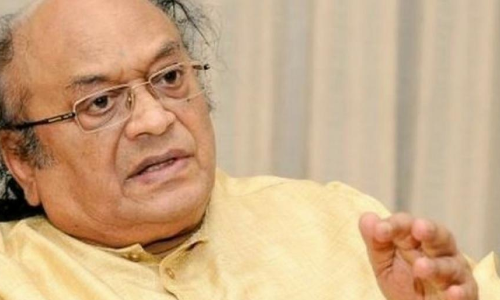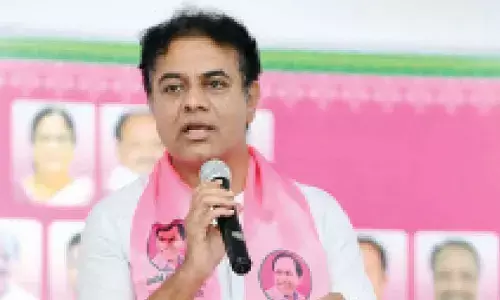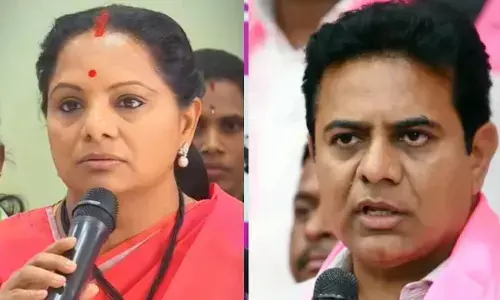Mellifluous message

It is rather ironical that for one who was revered in the literary world for his qualitative and prolific output, Cingireddy Narayana Reddy (Cinare) became a household name more because of the mellifluous songs he wrote for Tollywood films.
Cinare’s songs question man and society. It rebels against caste, class and religious orthodoxy. The songs remind us about the importance of human relations and peaceful coexistence. The iconic songs triggered consciousness, instilled confidence, rekindled hope and aspiration, revealed the true face of life and society and ultimately reflected the historical transformation of Telugu society
It is rather ironical that for one who was revered in the literary world for his qualitative and prolific output, Cingireddy Narayana Reddy (Cinare) became a household name more because of the mellifluous songs he wrote for Tollywood films.
The greatness of the man, who will continue to live in everyone’s hearts, is that he was never swayed by the theatrical verses. Rather, each lyric carried messages, which served as ‘enlightenment.’ Of course, given the genre in which he penned those songs, there was entertainment.
His ode celebrating motherhood in his heart-warming song (ammani minchi daivamunnada atmanu minchi addamunnada) stands out as the pinnacle of his filmy literature. Describing mother as the Goddess, who descended on Earth, he says if he was asked to choose between mother on one side and all the Gods on the other, he would prefer the former. Touchingly humane!
If one goes through the treasure trove he leaves behind, there is an overbearing touch of Mother and her universality. For him, a mother is represented in diverse forms. He equates the tree that offers shade and clouds that provide us the elixir of life to being a mother, the epitome of selfless giver.
In highlighting 'my mother is supreme,' Cinare has justifiably argued that irrespective of howsoever exalted position he reaches, he is just a son before his mother.
Today, we find that his messages, particularly those pertaining to the multidimensional mother, have profound applications and hold relevance to the present times when human relations are fast-turning into property relations.
Not surprisingly, he highlighted the greatness of fatherhood in an equal measure. Contrary to the popular belief that father is strong at heart; his song (Oh Naanna, Nee Manase Venna...) upholds the gentleness in fatherhood. The sacrifice of a father is seen when he walks on the bed of thorns to make a fertile bed of roses for his children.
Narayana Reddy was not a feminist writer, although his words glorified the role of women in the society. In Maanavajaathi Manugadake Pranam Posindhi Maguva..., he wrote that a woman with her sacrifices and love provides sustenance for human civilisation.
Narayana Reddy's songs probed the true meaning of education. His message to the illiterate in chaduvu rani vadavani digulu chendaku... brings forth the fact that education without character has no relevance. There is message even to the literate in this because the poet in him finds wisdom and conscience supreme in man. Education, per se, is not enough.
Narayana Reddy through his innumerable film songs reflected creatively on the changing dynamics of social and human relations. He traversed through the wide canvas of man-woman relations. Shunning obscenity and vulgarity, he discovers the chastity of love in friendship in his gunna mamidi komma meeda goollu rendu unnayi.... and purity of marital bonds. He underscores the fragrance of fraternal love in Annayya Sannidhi ade naku pennidi...
Cinare was a true-blue Telugu. In his song (telugu jati manadi ninduga velugu jati manadi...), he salutes the glory of Telugu history, culture and literary pride.
His love for the language remains unparalleled. In fact, he was as expressive in Urdu too. The felicity with which he used various Telugu dialects stands as practical lessons to the budding writers, poets and lyricists.
Rebuking the popular image of Rayalaseema perpetrated by commercial cinema, he exhorts the Telugu people to understand the history of this great land, which is the abode of divinity, sacrifice, valour and reforms. This has been particularly forceful in Edhigo Rayalaseemagadda deeni katha telusuko telugu bidda...
For one who was fascinated at observing things as and how they unfolded, Cinare was vocal in his criticism and lament of the decline of human relations at the altar of modernity and affluence as a result of which affection and bondage became societal victims. This particular aspect resonates in his touching song (Anubandham Atmeeyata Anta Oka Bootakam...). One can never bracket him as a pessimist or as a prophet of doom.
When a contemporary Telugu poet wrote that this is the fate of the heart (manassu) and the life of Man, Narayana Reddy countered with a parallel that implied that man cherishes the sweetness originating from hearty feelings. In many of his songs, Narayana Reddy reminds this generation of their responsibility towards parents.
Living for decades in Hyderabad, he imbibed in him the secular, cultural tradition of the city of pearls. In the classic Rim Jim Rim Jim Hyderabad that reverberates in the ears of Hyderabadis across the world, he speaks of the communal harmony of the city which epitomises the Ganga-Jamuna tehzeeb.
He propagated a secular, democratic and egalitarian outlook through his film songs too. For instance, in one of his songs, he declares education and wealth as universal rights. This is an artistic expression of the Constitutional vision of equitable distribution of wealth and opportunities.
Declaring that human dignity is non-negotiable, he calls it a birthright. In another song, he enunciates that freedom in nature is something that is supreme. Aesthetics and messages are profusely dovetailed in his film songs.
Repudiating the archaic social order, his song (gaali ki kulamedi nelaku kulamedi...) says that air and land have no caste.
Puttina roju pandage andariki.., which he wrote so eloquently should be played on everyone's birthday as a reminder of the objectives of human life. Fearing that we may forget the very objective of life caught in birthday celebrations, Cinare urges us to realise the purpose of birth.
Patriotism flows through his songs. He salutes the galaxy of social reformers in just one song. As we celebrate decades of achievements since Independence, Cinare with his Vandemataram Geetam (Vandemaathara geetham varasa maaruthunnadi Tharam maaruthunnadi aaswaram maaruthunnadi...) provides us with a wake-up call as it gives a chilling account of what India has not achieved. Contrasting with the noble ideals espoused in Vandemataram, he lyrically presents the other side of the story full of deprivation.
The universal humanist in him questions the social, regional, linguistic and religious barriers that create artificial walls in human civilisation. He wants these narrow fragmented walls to be brought down by the human spirit of oneness that has remained elusive.
Dwelling upon the contemporary themes, Narayana Reddy questions corruption and power mongering that is pervasive in current socio-political context.
In hundreds of his songs, he instils confidence in people. His film songs are true lessons in personality development and embody the spirit of unassailability in oneself. His songs exhort one not to bow down before anyone and not to seek anything from anyone.
At a time when cruelty, dishonesty and turpitude loom large over the social landscape, he reinforces confidence that nobleness and sincerity would ultimately prevail.
The uncompromising modernist in him takes on the obsolete social beliefs and traditions. He questions the outmoded forms of social practices like dowry-system.
Having come from an agrarian background, he pays a rich tribute to the life of a peasant. This shows that he always swore by his roots. Underscoring the intimate relationship between the land and the farmer, he recalls their unparallel contribution to society. When a host of social and economic policies are resulting in alienation of farmers from the land, Cinare's assertion of the life of farmer should come as an authentic and critical commentary on public policy.
Cinare’s song questions man and society. It rebels against caste, class and religious orthodoxy. The songs remind us about the importance of human relations and peaceful coexistence. The iconic songs triggered consciousness, instilled confidence, rekindled hope and aspiration, revealed the true face of life and society and ultimately reflected the historical transformation of Telugu society.
None could have brought those contrasts in life in the manner the colossus called Cingireddy Narayana Reddy could. He remains one for eternity, Rather than rue the loss, we should celebrate the magnificence of the Telugu literary giant.










